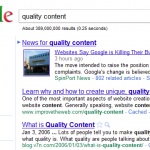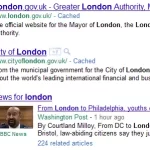SEO is often thought of as a purely commercial endeavor: companies and other for-profit websites use keywords strategically, make use of headings and meta tags, and build inbound links in order to increase search engine positions and generate more revenue. But in the world of academia, scholars are also recognizing a need to implement some of the same principles in order to market their research to a wider audience. This article will introduce this emerging world of academic search engine optimization (ASEO) and the criticisms that inevitably arise.
First, a 2010 article discusses the concept of ASEO and provides a set of guidelines that academics can use to increase the visibility of their scholarly articles in important academic search engines. The authors primarily discuss Google Scholar, PubMed Central, IEEE Xplore, and SciPlore.org, noting that there are a number of differences between these and traditional search engines.
For one, due to Google’s dominant market share over Bing and Yahoo, traditional SEO is essentially optimizing for one particular algorithm, and thus a more specific set of guidelines can be formed. In academic SEO, on the other hand, there is no single leader, so a more complicated and varied approach becomes necessary.
To take this even further, the authors explain that simply getting indexed in these scholarly databases can be a big challenge, as “only a fraction of all published material is available on the Web and accessible to Web-based academic search engines such as CiteSeer. Most academic articles are stored in publishers’ databases; they are part of the ‘academic invisible web,’ and (academic) search engines usually cannot access and index these articles.” Thus, scholars not only need to optimize their content in order to increase their rankings, they also need to work to get into the search engines in the first place.
Other key differences include the fact that an academic search engine will often only index the title and abstract of an article instead of the full-text. Also, although regular webmasters have the luxury of changing keywords and tags after the fact to adapt to changes, scholarly articles will stay the same once published, making SEO something that needs to be done correctly from the outset.
In the section on optimization, the authors give specific advice for writing scholarly literature that will rank well in academic search engines. This process entails selecting a particular keyword and ensuring that it appears in key places such as the article title, several times in the abstract, as well as through the body of the article. They also advocate using synonyms so that searchers might still come across the article even if they do not know the exact keywords.
In addition, the authors recommend using a “common scientific layout and structure” so that academic search engines can quickly recognize it is scholarly. They also explain the ranking benefits of building citations and referencing one’s other published work, although they do warn against taking unethical actions. Finally, they advocate using vector graphics instead of raster/bitmap.
The blog of the citation management tool Mendeley has published a Slideshare presentation titled Market or Perish, which places academic SEO into the larger context of marketing one’s scholarly research.
Many in the academic community, however, look at this whole world of academic SEO with some skepticism. The blog Webometric Thoughts disagrees with many of the points in the article, including the use of keyword synonyms, “which are necessarily near-synonyms in the precise scientific world,” as well as the general idea of considering search algorithms at all in the process of writing an academic article.
In addition, the current battle between open access scholarship and for-profit publishers plays a large role in the discussion, as companies that publish the work of scholars and sell it back to universities at a marked-up rate challenges the main goal of a wider dissemination of academic research.
Academic SEO is definitely an important concept, but scholars should avoid giving too much consideration to search algorithms, and should certainly refrain from any unethical practices, although Google Scholar has been found to be easier to spam than regular Google.



Great post. I especially liked the discussion–and the links–about the battle between open access scholarship and for-profit publishers. Seems like a big battle brewing. You should write more on this.
It certainly is a major battle between two groups with radically different worldviews. Thanks for the suggestion; it does deserve a more complete look.